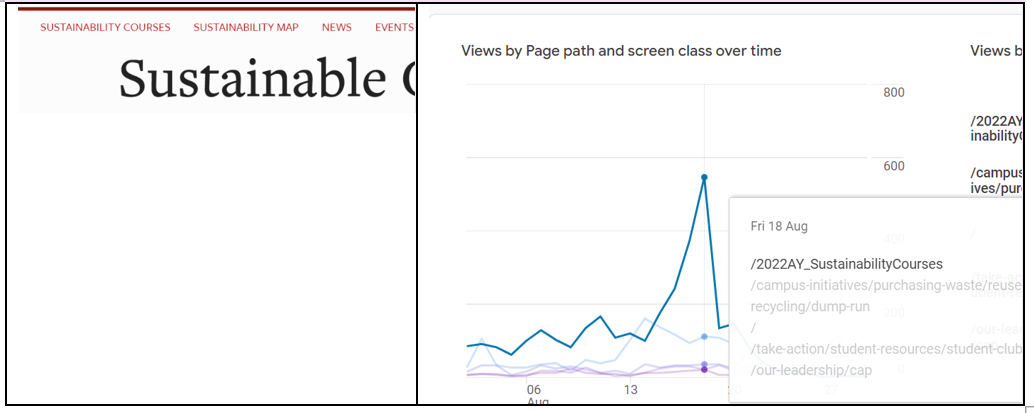
Cornell is the only institution of higher education in the world to receive the highest possible sustainability rating—STARS Platinum—for four consecutive years. STARS is a highly respected self-reporting framework for colleges and universities to measure their sustainability performance. As such, this honor underscores the university’s deep commitment to sustainability across academics, operations, and public engagement.
The STARS Platinum rating reflects Cornell’s aspiration to serve as a living laboratory for the discovery and demonstration of sustainable solutions to local and global challenges, an aspiration exemplified in its Climate Action Plan. According to the STARS platform, which offers peer comparison and normalization tools, the Ithaca campus has reduced greenhouse gas emissions more than 50% and building energy consumption by 30% from the 2005 STARS baseline, despite campus expansion.
Committing to change
In 2007, Cornell's president signed the American College and University Presidents’ Climate Commitment, pledging Cornell University to work toward carbon neutrality. This commitment helped establish Cornell as a trailblazer and a sustainability leader amongst its peers - including transparent and comprehensive reporting.
Today, an overwhelming majority of Cornell students (98.5%) report that they are concerned about the state of the environment. Sustainability related courses are offered in every college. An online orientation module, “Mission Sustainability,” encourages new students to identify sustainability related courses within and beyond their major, and to consider which of these courses they might be interested in taking while at Cornell.
The Campus Sustainability Office (CSO) has worked diligently to identify and highlight Cornell’s sustainability courses and degree programs in a convenient online location. Initially an effort to respond to STARS, this list has become a valuable tool supporting Cornell's academic mission and sustainability literacy goals. Instead of scrolling through hundreds of course listings to find a class on the Ethics of Eating, students can use this tool to peruse more than 700 sustainability related classes—including some they might not have considered (and prior generations of Cornellians might not have dreamed of).
How times have changed: 15 years ago today In Fall 2008, Cornell shifted from a paper course roster to online registration. Prior to this switch, Cornell students had to page through a voluminous printed roster to choose their classes. These printed rosters are now archived in the university library—a relic of our pre-digital era.
Tracking progress
Compiling the online course list is “very labor intensive” reports Lisa Kilgore, sustainability coordinator for CSO, but the impact is tangible. Lisa, who keeps a close eye on web analytics, reports that hundreds of students use this resource.
In her role, Lisa helps to oversee Cornell’s STARS (Sustainability Tracking, Assessment & Rating System) program.
“Institutions that participate in STARS have the option to submit a report every three years,” Lisa explains. “Cornell submits a report EVERY year because the University believes it is important to keep the community engaged and create a baseline for continuous improvement,” she says.
The STARS reporting process extends far beyond academics to touch nearly every part of Cornell—from lighting campus to finding renewable heat sources, helping dining halls manage their waste, and fostering a culture of equity and inclusion. A network of about 75 staff, faculty, and student reporters across campus gather and submit extensive quantitative and qualitative data on Cornell’s performance through a process developed by Careen Arsenault, Lisa's predecessor. Cornell’s STARS report is next reviewed by a peer institution, and, finally, by the STARS administration.
Collectively, the actions that Lisa and her team report on each year have distinguished Cornell as a ‘Top Performer’ among its peers. As measured by STARS, Cornell is the only institution of higher education to receive the highest possible sustainability rating—STARS Platinum—for four years running.
Finding solutions
Cornell’s top performing categories were recently featured in the 2023 Sustainable Campus Index (SCI), a new STARS resource to share promising trends and innovations with peer institutions.
The SCI spotlights the success of Cornell’s sustainability actions across several dimensions. Some highlights include:
- Curriculum: Cornell offers 700+ sustainability related courses and a Mission Sustainability orientation module, which invites all incoming students to learn about sustainability and climate change during their Cornell career.
- Research: Cornell incentivizes and supports sustainability research through the Cornell Atkinson Academic Venture Fund (AVF) and Rapid Response Fund (RRF). The AVF provides over $1.5 million in funding annually for energy, environment, and economic development projects. The RRF provides small grants to faculty/staff for urgent or time-sensitive research, workshops, and other sustainability initiatives.
- Campus Engagement: Cornell students (undergraduate, graduate, and professional students) from across all colleges are invited to join one of the more than 40 campus clubs with a sustainability theme—ranging from the Beekeeping Club to Anabel’s Grocery, Engineers for a Sustainable World, and Greeks Go Green. If students don’t find the club they’re looking for on the list, they’re encouraged to start a new one. ECO (the Cornell Environmental Collaborative) serves as the umbrella organization, and coordinates resources, funding, and advocacy among the various organizations.
- Public Engagement: Cornell’s Cooperative Extension Education (CCE) provides educational programs and resources to citizens across New York State (and beyond). CCE programs share best practices for integrated pest management, invasive species control, youth education enrichment, adapting agricultural practices in the face of climate change, family nutrition and budget balancing, community planning, and more.
- Coordination & Planning: Since 2008, an interdisciplinary team has been responsible for advancing sustainability at Cornell. The Sustainable Cornell Council (SCC) leads numerous working groups, with broad membership from across campus, who implement specific sustainability projects, initiatives, and campus research (for example, the Green Hydrogen Working Group and the Dining Operations Food Waste Working Group). SCC members help facilitate conversations within units about how to enact Cornell’s Climate Action Plan and create deep, sustainable change.
- Diversity & Inclusion: From its founding, Cornell has been committed to fostering a campus climate and culture of respect. In Fall 2018, Cornell embedded intergroup dialogue sessions into first-year orientation. The sessions are interactive and peer-led, and provide opportunities for small groups of students to learn more about themselves and one another. All new students practice skills and tools for communicating across difference both inside and outside the classroom, through sessions facilitated by the Intergroup Dialogue Project (IDP). IDP also works to engage the entire campus community, including faculty and staff.




